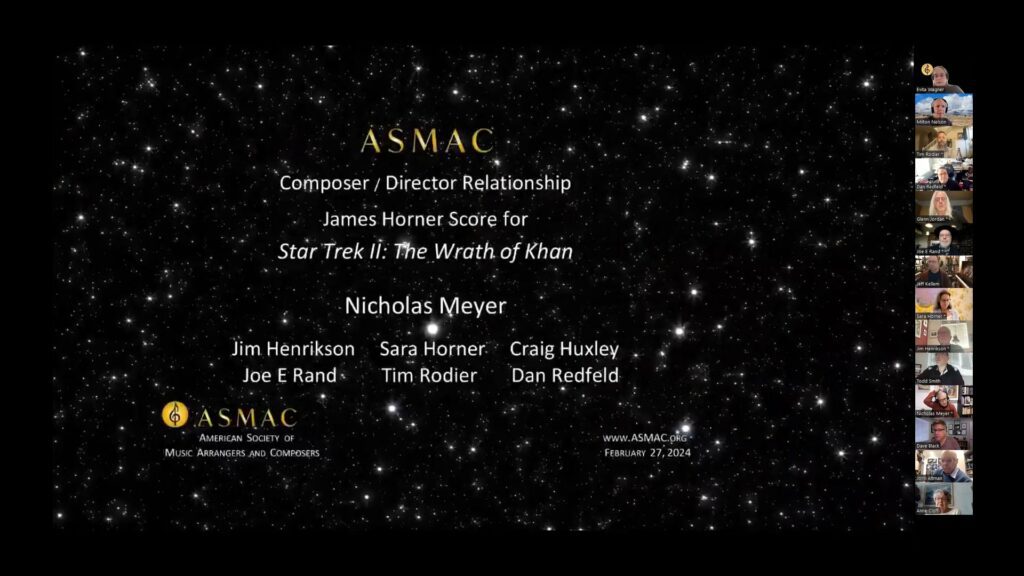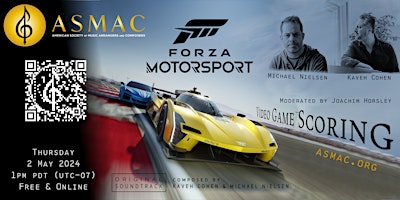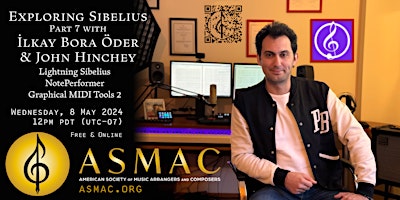Date: Tuesday, 27 February 2024
Event: Online International Event hosted by ASMAC on the Zoom platform. Re-watch the 3-hour event video.
Distinguished Guests:
- Nicholas Meyer, Director
- Sara Horner, wife of deceased composer James Horner
- Musicians Craig Huxley and Fiona Huxley
- Tim Rodier, composer and score engraver for Omni Music Publishing
- Joe E Rand and Jim Henrikson, members of James Horner’s music editing team
- Dan Redfeld, composer, and arranger
Star Trek II: The Wrath of Khan is a 1982 American science fiction film directed by Nicholas Meyer and based on the television series Star Trek, created by Gene Roddenberry.
During the webinar, Nicholas Meyer provides detailed insights into his dynamic working relationship with acclaimed composer James Horner, highlighting their collaborative efforts at various stages of the filmmaking process, including spotting and post-production. Meyer’s discussion not only involves the technical aspects of their partnership but also delves into the personal dynamics and creative synergy between the two. This enriches the understanding of their collaboration, offering a glimpse into the shared vision and mutual respect that defined their working relationship. These reflections resonate with Meyer’s book The View from the Bridge: Memories of Star Trek and a Life in Hollywood, published in 2009, where he further explores his experiences in Hollywood and the profound impact of his collaborations, particularly with Horner.
The Wrath of Khan delves into several recurring themes, notably death, resurrection, and the passage of time. Director Nicholas Meyer found a significant correlation between Spock’s demise and the aging process of the characters. Reflecting on his script, Meyer remarked, “This was going to be a story in which Spock died, so it was going to be a story about death, and it was only a short hop, skip, and a jump to realize that it was going to be about old age and friendship.” It’s interesting to note that Meyer initially preferred to call the movie The Undiscovered Country, a line from Shakespeare’s Hamlet that symbolizes the themes of death and rebirth. However, this title was altered without his awareness during the editing process.
Meyer strategically integrated elements to underscore the characters’ aging. They primarily revolve around narrative and character development rather than visual or technical aspects. McCoy’s gift of reading glasses serve to exacerbate Kirk’s dissatisfaction with his birthday. They are woven into the storyline and character interactions to convey the passage of time and the characters’ grappling with their mortality. While the script specified Admiral James T. Kirk’s age as 49, actor William Shatner initially hesitated to explicitly state Kirk’s age on screen. This hesitation reflects the sensitivity surrounding the portrayal of aging in Hollywood, where actors often strive to maintain youthful appearances. Producer Harve Bennett had to reassure William Shatner that embracing the character’s maturity, akin to Spencer Tracy’s graceful aging, was fitting. Additionally, Khan’s relentless pursuit of Kirk serves as a focal point for the film’s theme of vengeance, drawing inspiration from Herman Melville’s Moby-Dick. Meyer deliberately included these references to the novel, such as a visible copy of Moby-Dick in Khan’s quarters.
Nicholas Meyer is an award-winning author, screenwriter, and director. His body of creative work in publishing, film, and television spans more than five decades. Meyer’s sixth Sherlock Holmes novel, Sherlock Holmes and the Telegram from Hell, will be published at the end of August 2024 by the Mysterious Press. Meyer made his directing debut in 1979 with a film he wrote, Time After Time, starring Malcolm McDowell, Mary Steenburgen, and David Warner. Apart from Star Trek II: The Wrath of Khan, other directing credits include Volunteers (1986), The Deceivers (1988), Company Business (1991), Star Trek VI: The Undiscovered Country (1992), and the HBO film Vendetta (1999). His screenplays include Sommersby (1993), contributions to Fatal Attraction (1987), and Dreamworks’ Prince of Egypt (1998). His other books include Target Practice, which was nominated for an Edgar Award, and four other Sherlock Holmes novels: The Adventure of the Peculiar Protocols (2019), The West End Horror (1976), The Canary Trainer (1993), and The Return of the Pharaoh (2022). His autobiographical novel Confessions of a Homing Pigeon was published in 1981.
During the event, we had a chance to view the manuscript as well as the newly engraved score by Tim Rodier, from Omni Music Publishing, along with the chosen movie scenes being played with the music. While working on the movie, the director had previously wished to hire Jerry Goldsmith as a composer; however, there was no budget. So he was listening to the tapes of not-yet-discovered aspiring composers. He wanted to have someone who was unique rather than someone who composed like everyone else. Trained as a classical pianist and composer, Horner made an immediate impression with his unique melodic orchestration and spotting skills, which consistently captured the heart of every film he scored. The director recalled that Horner was always coming by and playing his themes on piano, which helped him envision the movie as a whole. During the post-production of Star Trek, while most of the film was “locked in” by the time Horner had begun composing music, he had to change musical cue orchestration after the integration of special effects caused changes in scene durations.
Horner’s music captured the essence of the film and even brought out the sense of Star Trek’s fanfare. James Horner won two Academy Awards for James Cameron’s Titanic (1997), which became the best-selling orchestral film soundtrack of all time. He also composed some of the most iconic scores of the past 30 years, including Star Trek II: The Wrath of Khan, Star Trek III: The Search for Spock, Braveheart, Avatar, Field of Dreams, Cocoon, Willow, and dozens of other well-known titles. He spent his early years in London, where he attended the Royal College of Music and studied with György Ligeti. He later returned to America, attending Verde Valley School in Sedona, Arizona, and eventually earned his bachelor’s degree in music from the University of Southern California. After obtaining a master’s degree, he began his doctorate studies at the University of California, Los Angeles (UCLA), where he studied with Paul Chihara, among others.
Following several scoring assignments with the American Film Institute in the 1970s, he concluded teaching a music theory course at UCLA and transitioned to film scoring. Additionally, he penned hit songs, including Céline Dion’s chart-topper My Heart Will Go On from Titanic and the Linda Ronstadt/James Ingram hit Somewhere Out There from An American Tail.
While exploring the musical cues of James Horner, we have also met Craig and Fiona Huxley. Craig Huxley is a notable figure in the realm of music and innovation. He introduced a groundbreaking musical instrument called the Blaster Beam in the 1970s. His creation, an aluminum refinement of the blaster beam, garnered significant attention and was patented in 1984. This instrument found its place in cinematic history, being featured in the soundtrack of Star Trek: The Motion Picture. Huxley’s mastery of his invention extended beyond the realm of science fiction, as he showcased its capabilities in the soundtrack of 10 Cloverfield Lane. During the recording sessions, Craig Huxley himself took on a central role, performing on the instrument he meticulously designed.
Additionally, Huxley released an album in 1984 for Star Trek movies, named Genesis Project, with experimental and ambient music involving Blaster Beam and synthesisers such as Serge Modular, where he also demonstrated his prowess as a composer and electronic music performer, further solidifying his expertise as a multifaceted artist in the music industry. The whole album was recently remixed and re-released on February 22, 2024, which fragments of it we had a chance to listen to during the webinar.
During the event, we met Joe E Rand and Jim Henrikson, who shared their experiences of working with a composer. Jim Henrikson, an experienced music editor since the original Star Trek series, has worked closely with Horner since Willow in 1988. Joe E. Rand, on the other hand, has contributed to well-known films like Deep Impact, Unbreakable, Hidalgo, The Matrix, Jurassic Park III, and The Bone Collector. Together, Rand and Henrikson brought their expertise to enhance Horner’s musical compositions with their editing skills.
The event offered an enriching educational experience centered around James Horner’s score for Star Trek II: The Wrath of Khan. Attendees were not only introduced to the creation of the soundtrack but also to valuable lectures such as Igor Stravinsky’s book Poetics of Music in the Form of Six Lessons. Additionally, the event shed light on Huxley’s recording studio and delved into his early acting roles in Star Trek: The Original Series, including his portrayal of characters like Captain James T. Kirk’s nephew. The highly successful event allowed participants to immerse themselves in the unique and wonderful music of James Horner. Overall, a delightful experience.”
The score for Star Trek II: The Wrath of Khan can be obtained for score study purposes direectly from Omnimusic Publishing in the USA as well as in the Europe via Schott Music.




